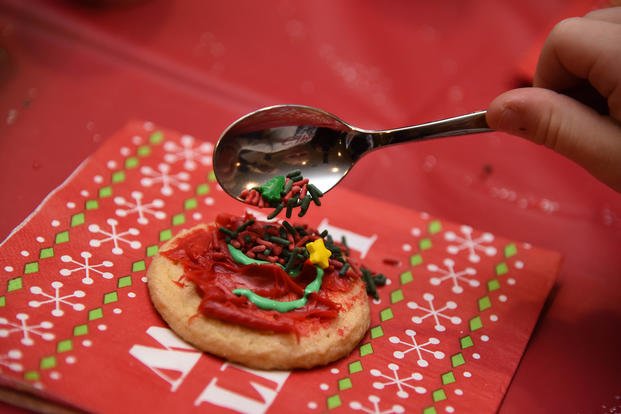A study by the National Institutes of Health shows that most Americans only gain 2 pounds at the most between Thanksgiving and New Year's Day. The problem is that most of us do not lose that extra pound or two in the year that follows. The added stress of holiday travel, shopping, projects at the end of the school year and other factors also can cause weight gain. However, the medical researchers concluded that the two main factors that influence weight gain are hunger and activity level.
So what can you do to help yourself maintain or even lose weight over the holidays? If you are motivated to lose weight, the following tips may help you not only to lose weight over the holidays, but throughout the year. Maybe by the holiday season, you will be 50 or more pounds lighter and highly active with a fitness program.
1. Drink water
Water naturally is going to help you not eat as much if you drink a large glass 15-20 minutes before having a large Christmas dinner. Water will keep you hydrated and help you burn fat more efficiently.
2. Eat slowly
Eat very s-l-o-w-l-y and enjoy the flavors. Try to chew your food at least 30-40 times per mouthful. It works and will allow the "hungry-full" response from your brain to tell you that you are satisfied. It takes the brain about 20 minutes to let you know you are full.
3. Do not skip meals
Skipping breakfast to eat a huge lunch plays a one-two punch on your metabolism. Skipping a meal will keep your metabolism low, and eating until you are rolling away from the dinner table will make you feel like sleeping in front of the television. This is prime weight-gain time for your body.
4. Work out in the morning
To avoid that slower metabolism during the holidays, I have developed an annual habit of a harder-than-average workout on the big eating days of the holidays. Typically, go for a 45- to 60-minute walk, jog or bike to get the metabolism going in the morning. For an added caloric burn, add in some weight training or calisthenics for 20-30 minutes like the following routine:
Repeat five times.
-
Warmup with crunches
-
Run/PT
-
Run five minutes
-
Push-ups 10-20
-
Crunches 20
-
Push-ups max in 1-2 minutes (Do knee push-ups if you have to)
-
Rest two minutes
-
Sit-ups max 1-2 minutes (or crunches)
-
Rest two minutes
-
Pull-ups max (if possible)
-
Dumbbells (heavy, light weight like 10-, 15- or 20-pound dumbbells for 10-15 reps)
-
Biceps curls 10, 15
-
Military press 10, 15
-
Hammer curl 10, 15
-
Triceps extension 10, 15
Typical cardio/PT option
Warmup 5-minute walk/jog/stretch (see "The Stretching Plan")
Walk, run, bike, swim or elliptical glide 30 minutes
*If you are a beginner, it is best to just start a walking program. Any new activity will be harder than normal for you, so do not overdo it. Read my free "45-Day Beginner Program" (PDF); it will help you build good habits through the holidays.
A family or neighborhood basketball game or tough football game is always a good way to work off the holiday meals, too.
5. Don't eat after 8 p.m.
Try to eat dinner before 7 p.m. and not snack after 8 (unless you are on the night shift or plan on being awake for six more hours). Many of us eat because it is "time" to eat. In other words, we eat out of habit, not because we need to eat. Eat snacks whenever you "need" to; fruits, vegetables, yogurt or a tuna sandwich are great midday snacks that will help your body stay in fat-burning mode. Don't go more than five hours during the day without eating. It causes you to eat more at mealtime and decreases your metabolism.
6. Brush your teeth after meals
Right after eating a meal, especially dinner, go straight to the bathroom to brush, floss and use mouthwash so that your mouth is feeling nice and clean. This makes it less appealing to eat more (especially before bedtime). Ever try to eat or drink something after brushing your teeth? Not tasty.
7. Don't confuse thirst with hunger
Chew sugarless gum and/or drink water. Most people confuse hunger with dehydration. Drinking a glass of water usually will take care of the food yearning. This is not skipping a meal, just a way to work through temptation. An optimal level of water per day, as stated by the National Institutes of Health, is a half to one gallon a day. Add one extra glass (8 ounces) of water per every 10 pounds of being overweight, too!
Good luck with the holiday season. Try to work off many of the stressors by giving yourself a present of 30 minutes to exercise or walk. You will feel better for it.
Stew Smith is a former Navy SEAL and fitness author certified as a Strength and Conditioning Specialist (CSCS) with the National Strength and Conditioning Association. Visit his Fitness eBook store if you're looking to start a workout program to create a healthy lifestyle. Send your fitness questions to stew@stewsmith.com.
Want to Learn More About Military Life?
Whether you're thinking of joining the military, looking for fitness and basic training tips, or keeping up with military life and benefits, Military.com has you covered. Subscribe to Military.com to have military news, updates and resources delivered directly to your inbox.


















